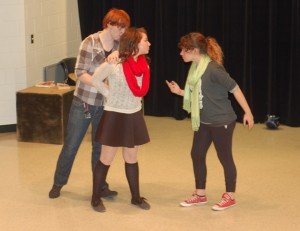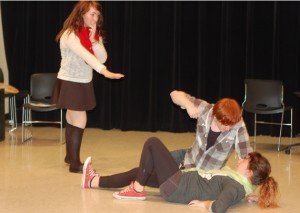
Patriot High School theatre students will perform a play this Friday at 6:30 p.m. that deals with loss and violence and addresses a range of socioeconomic and race issues.
“Twilight Los Angeles, 1992” is a one-act which portrays the testimony of real people whose lives were affected by the Rodney King riots in Los Angeles.
In the two years following the riots, playwright Anna Deavere Smith compiled accounts from hundreds of Los Angelinos, informing “Twilight Los Angeles, 1992.” She then performed the play as a one-woman show, assuming the identities of 40 individuals, speaking their words and telling their stories.
Patriot High School director Kathryn Facemire decided to take that play, adapt it as a one-act, and cast 40 students to assume those identities. When those students are not voicing their monologues, they are creating a tableau to visually portray the scene like a flashback for the audience.
“Initially the author played every character. She had a minimalistic set where she had a table and a couple of chairs and addressed the audience as these characters. In this version, there are 40 actors, and not all of them play specific characters, and I’ve incorporated two musical pieces,” Facemire said.
Facemire knew it was a bold piece to choose, but she wanted to produce a message play that would teach her students something about recent history that was relevant to their experience.
Despite having the first African American president, Facemire’s students know they do not live in a post-racial society. They interpret the racism they encounter today as a result of both the recession and a pushback against more progressive attitudes.
“We’ve had a lot of conversation. One of the things that keeps coming up is my students feel as though there is even a greater need for a piece like this now. They see more racism and more hate now; they see an even greater divide. They feel like economic turmoil has pushed their community backwards,” Facemire said.
Facemire knew producing this play would provide not just an education for the students, but for the audience as well. While most adults learned about the L.A. riots through watching the news on television, "Twilight" shows those depictions hardly scratch the surface of the problems within that community.

“The media gave us the videos, the beatings of Rodney King and Reginald Denny, but they didn’t give us the circumstances leading up to them,” Facemire said. As a young person in the 1990s, Facemire learned more about the riots from narratives told through hip-hop and punk rock music.
She believes, “Twilight Los Angeles, 1992” will correct the collective gap in our knowledge about the L.A. riots, while advocating for peace in the aftermath of violence.
And, once she made it clear to the administration that the material was appropriate yet poignant, they stood behind her choice of material.
“They were very supportive. They needed to know that the piece wasn’t celebratory of violence or racism or rioting. I did have to send home a waiver with each student, so their parents understood how serious this piece was,” Facemire said.
The play also requires the cast to demonstrate the raw emotion of the individuals affected by the riots. Actors were not just speaking lines written for fictional characters, but the testimonies of actual survivors.
“Personally, I really get emotional with my role,” said junior Eric Gordon. “(I play) an anonymous juror. I detail the abuse my character receives from the citizens preceding the trial, and the effect it had on his family. I’m very close to my family, and I thought about how devastating it would be to me and it contributed to my efforts in the role,” Gordon said.
Student actors also had the challenge of creating the tableau on a dark stage. Sophomore Heather Ogden said she and her cast mates were not used to holding one position for several minutes.
“Just trying to stay focused and doing whatever you can to not move, was kind of hard,” Ogden said, but admitted “I wanted people to be wowed by it, so that was my drive.” On Friday night, she expects the audience will say, “Wow, how can they do that? That must take a lot of effort and time.”
Millennials also had to reconcile the race riots of the 1990s within the paradigm of twentieth century history, which none of them have experienced first hand. Although 1992 is before her time, to Ogden, it did not seem like that long ago.
“I just didn’t think it was this close and relevant. I would think it would happen like 100 years ago. My mind kind of blew,” said Ogden.
Throughout the process, Facemire’s students learned the power of theatre for portraying powerful messages and enacting social transformation. It is a project they are proud to take part in as actors and even activists.
“I was really shocked to hear the vivid details, because my parents always raised me on the truth. Hearing that it affected everyone: the Korean shop owners, over 60 people being dead, you can’t just say, ‘I can’t be a part of it.'" said Gordon. "You have to be a part of it, because once you know about it, it’s your responsibility to let other people know about it.”
Support Bristow Beat - Donate Today!